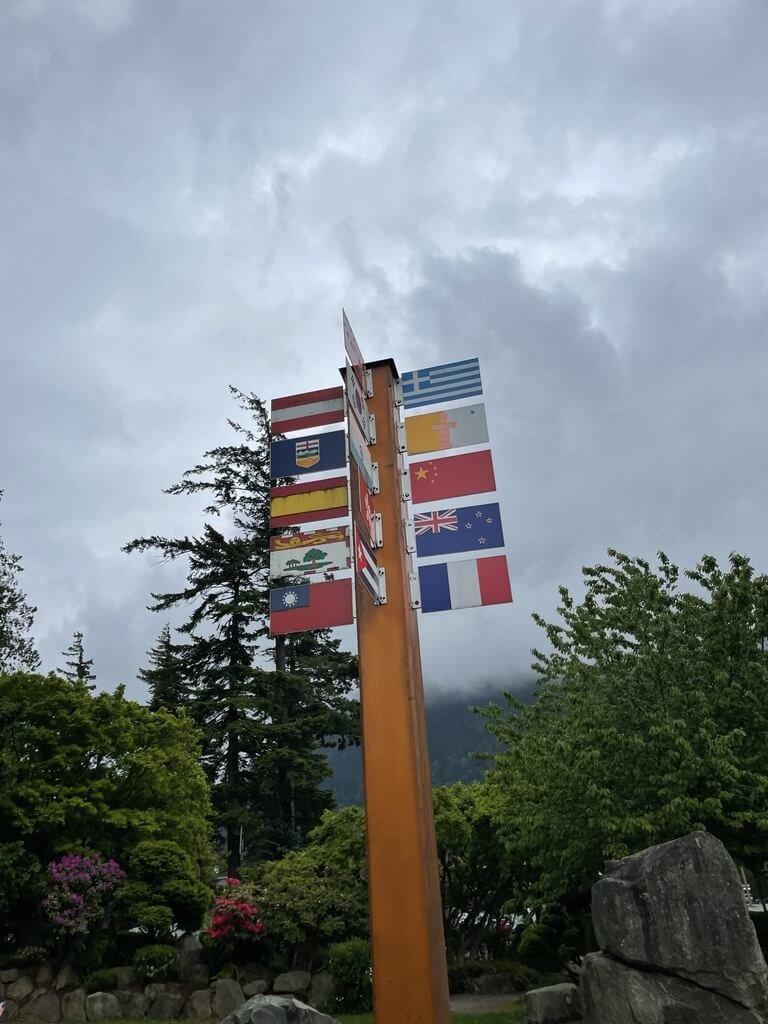A town in Canada has decided to reinstate a Taiwan flag at a bus stop that it took down last year due to complaints from China.
With a population of about 7,000 people, Hope is a small, but well-known town in British Columbia, about 150km east of Vancouver.
The town is known for its peaceful and friendly atmosphere, but unexpectedly became a battleground in the diplomatic struggle between Taiwan and China.

Photo courtesy of the Taipei Economic and Cultural Office in Vancouver
The local government built a new bus station next to Memorial Park 16 years ago and erected two flagpoles beside it, decorating each with 20 metal flags.
All of Canada’s provincial flags were hung, as well as national flags from many countries around the world, including China and Taiwan.
These flags hung peacefully for more than a decade, until July last year, when Hope Mayor Victor Smith received a letter from China’s consulate in Vancouver.
The letter said that hanging the Taiwan flag contravenes Canada’s “one China” policy and demanded it be taken down.
Smith responded the next day saying he had made a mistake and promising to remove the flag.
This summer, some Taiwanese living abroad noticed the flag was gone and posted about it online, calling for people to write to the Hope government.
Last month, Taipei Economic and Cultural Office in Vancouver Director-General Liu Lih-hsin (劉立欣) wrote a letter to Smith stating that removing the flag hinders the close relationship between Taiwan and Canada.
The Hope Town Council discussed the issue on Monday and agreed that the Taiwan flag should be reinstated.
The flag symbolizes a commitment to democratic values, civil connections and self-expression, and does not reflect a formal diplomatic relationship or contravene Canada’s official policies, the council said.
Liu thanked the council for making a fair decision, as well as overseas Taiwanese for voicing their concerns to the local government.

Nipah virus infection is to be officially listed as a category 5 notifiable infectious disease in Taiwan in March, while clinical treatment guidelines are being formulated, the Centers for Disease Control (CDC) said yesterday. With Nipah infections being reported in other countries and considering its relatively high fatality rate, the centers on Jan. 16 announced that it would be listed as a notifiable infectious disease to bolster the nation’s systematic early warning system and increase public awareness, the CDC said. Bangladesh reported four fatal cases last year in separate districts, with three linked to raw date palm sap consumption, CDC Epidemic Intelligence

The manufacture of the remaining 28 M1A2T Abrams tanks Taiwan purchased from the US has recently been completed, and they are expected to be delivered within the next one to two months, a source said yesterday. The Ministry of National Defense is arranging cargo ships to transport the tanks to Taiwan as soon as possible, said the source, who is familiar with the matter. The estimated arrival time ranges from late this month to early next month, the source said. The 28 Abrams tanks make up the third and final batch of a total of 108 tanks, valued at about NT$40.5 billion

Two Taiwanese prosecutors were questioned by Chinese security personnel at their hotel during a trip to China’s Henan Province this month, the Mainland Affairs Council (MAC) said yesterday. The officers had personal information on the prosecutors, including “when they were assigned to their posts, their work locations and job titles,” MAC Deputy Minister and spokesman Liang Wen-chieh (梁文傑) said. On top of asking about their agencies and positions, the officers also questioned the prosecutors about the Cross-Strait Joint Crime-Fighting and Judicial Mutual Assistance Agreement, a pact that serves as the framework for Taiwan-China cooperation on combating crime and providing judicial assistance, Liang

A group from the Taiwanese Designers in Australia association yesterday represented Taiwan at the Midsumma Pride March in Melbourne. The march, held in the St. Kilda suburb, is the city’s largest LGBTQIA+ parade and the flagship event of the annual Midsumma Festival. It attracted more than 45,000 spectators who supported the 400 groups and 10,000 marchers that participated this year, the association said. Taiwanese Designers said they organized a team to march for Taiwan this year, joining politicians, government agencies, professionals and community organizations in showing support for LGBTQIA+ people and diverse communities. As the first country in Asia to legalize same-sex